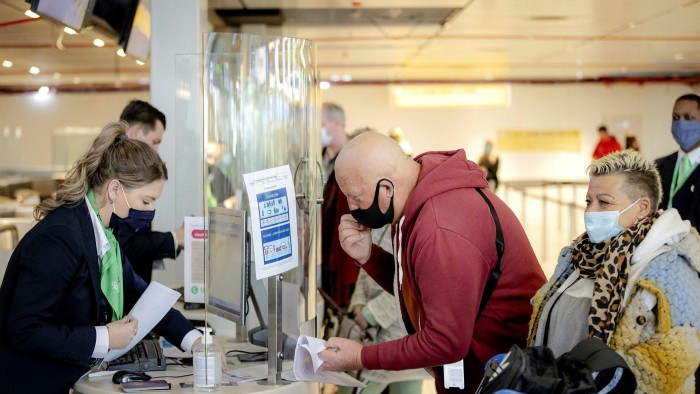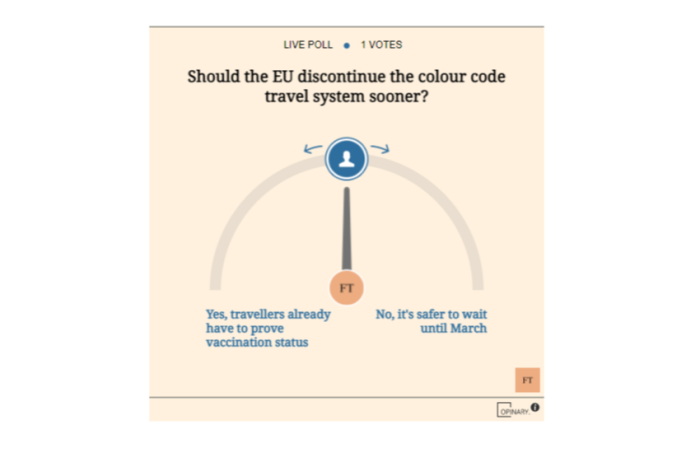EU to move away from country-wide travel restrictions

Roula Khalaf, Editor of the FT, selects her favourite stories in this weekly newsletter.
Good morning and welcome to Europe Express.
We’ve all been there, at the airport counter, with the stash of Covid-19 papers, gripped by anxiety that the country you’ve visited has turned a darker shade of red, meaning quarantine upon arrival. The paperwork won’t disappear in the future, but at least the EU is seeking to move away from colour-coded countries to a more individual approach: is the traveller vaccinated and if so, how long ago? I’ll unpack the European Commission’s announcements on travel restrictions and boosters and what timelines are expected.
Over in Rome today, Emmanuel Macron and Mario Draghi are rekindling ties via a long-planned Franco-Italian co-operation treaty, which was thwarted by hostile politics in Rome. We’ll explore what this pact is about and how likely it is for the repaired relationship to last.
Meanwhile, in a new instalment of the Brexit saga over fishing rights, fishermen on the French side have said they will blockade three French ports and prevent trucks going through the Channel Tunnel today.
And in more disruption news, if you live in Brussels and were planning to hail a ride with Uber later tonight — tough luck. A court ruling earlier this week de facto banned the app from Belgium’s capital (though if you live in other cities in the country you can still use the app).
This article is an onsite version of our Europe Express newsletter. Sign up here to get the newsletter sent straight to your inbox every weekday morning
In vax we trust
Travel in 2022 will still involve a lot more paperwork than in pre-pandemic times, but the focus will shift from the epidemiological situation in the country of origin to the vaccination status of each traveller.
The commission yesterday proposed changes to the travel restrictions framework in place since March 2020, which recommends a ban on non-essential travellers from countries with a high incidence of Covid-19 cases. Currently only 19 countries outside the EU are on a green list of non-restricted travel (neither the UK nor the US is included).
“We are moving away from this country-based approach to an individual approach. All people that are vaccinated can come into the EU,” said home affairs commissioner Ylva Johansson.
The proposals are subject to approval by member states.
Several deadlines were mentioned yesterday:
January 10: for travellers from outside the EU who show proof of vaccination to start counting backwards and make sure that their second shot was not older than nine months
March 1: for doing away with the colour-coded origin countries for travel restrictions
Six months from the second shot: when the vaccine starts to wear off and when people should be offered a booster jab
Nine months from the second shot: when the EU Covid-19 certificate expires unless the person has received a booster vaccine
In addition, several caveats on the type of the vaccine are considered — on rules that will apply as of March 1:
If travellers have been inoculated with vaccines approved by the World Health Organization but which have not been authorised on the EU market, travellers will also have to produce a negative PCR test result.
People who have recovered from Covid-19 can also travel freely to the EU, but will have to show a negative PCR test result. The same rule will apply to children.
The colour codes will still be used within the EU for additional restrictions for the non-vaccinated or people who have just recovered from Covid-19, said justice commissioner Didier Reynders.
The criteria for putting regions in one of the red, yellow or green categories will change: in addition to the number of new cases and the viral reproduction rate, they will also consider the vaccine uptake and the testing rate in each region. “This takes into account that vaccinated persons are better protected from transmitting the virus, even if not completely,” Reynders said.
With several countries having imposed lockdowns in recent days, Reynders warned of the rising danger of fragmentation: “We see a clear risk there may be diverging approaches between countries and may endanger trust in the Covid certificate and impede freedom of movement in the EU.”

Is March 1 a rather late deadline for the EU to discontinue the colour-coded travel system? To take the poll, click here.
Chart du jour: Pandemic boost
Unlike the UK and US, where record numbers of people have left the labour force, France and some other EU countries have avoided the trend known as the “Big Quit”: the proportion of French working-age people employed or seeking work has risen to 74 per cent, a record high. (More here)
Mario and Manu
After years of diplomatic tensions, France and Italy today are to seal a pact of friendship and co-operation, which should serve as an anchor for when the relationship returns to choppier waters, writes Davide Ghiglione in Rome.
France’s President Emmanuel Macron, who arrived in Rome last night for the occasion, is seeking to cement ties with Italy’s Prime Minister Mario Draghi, via the so-called Quirinale treaty. Both leaders see eye to eye on many points on which co-operation will be enshrined in the pact, including on foreign policy, defence and education.
The idea of closer co-operation between the two countries was discussed in 2017 by Macron and Italy’s PM at the time, Paolo Gentiloni. But just a year later, plans were shelved by the ruling coalition of Five Star and the nationalist League, which clashed badly with Paris over EU migration.
France recalled its ambassador from Rome in 2019 to protest against “interference” in its domestic politics, after Luigi Di Maio, Italy’s deputy prime minister then, met a group of anti-Macron yellow vest protesters near Paris.
Now, with the former European Central Bank president at the helm in Rome, Italy’s nationalist-populist impulses have been so tamed that even the League favours the treaty.
Politically, a better relationship with Paris could be used by the Draghi government to play a more active role at a European level, particularly at a time when Germany is expected to be focused more on domestic politics as the new government takes the reins from Chancellor Angela Merkel.
On the other hand, strengthening ties with Rome could help Macron bolster the moderate, western European core of the EU and gain leverage against populists at home while securing an important ally to support him during the French presidency of the EU which starts in January.
The treaty, consisting of 12 chapters, comes at a moment of relative tranquillity ahead of turbulent times for Italian politics and before presidential elections in France in which Macron is expected to seek re-election.
In the short term, the unknown is how long the Draghi government will last.
Italy’s President Sergio Mattarella, the man who was instrumental in putting Draghi in office this year, steps down next year. There has been much speculation in Rome about whether Draghi will then take the opportunity to step up to replace Mattarella as president, or whether he will instead decide to remain as prime minister until the end of the current parliament, a year later, in 2023.
Both leaders’ uncertain future is even more a reason to band together at an EU level and push, for instance, for a quick reform of the EU’s fiscal rules to allow more carve-outs for green investments.
What to watch today
Emmanuel Macron and Mario Draghi sign the Franco-Italian treaty in Rome
Belgian and Dutch authorities to decide on further Covid-19 restrictions
Smart reads
Workplace biometrics: In the absence of a coherent rulebook on the use of biometric technologies in the workplace, Bruegel has put out a policy proposal classifying these technologies, based on their main function and identifying pros and cons for each category.
Ukraine link-up: Connecting the country to the continental European power grid and the EU’s electricity market is technically complicated and requires profound reforms to the Ukrainian electricity sector, German think-tank SWP writes in this analysis. But it is not only Ukraine that has to deliver: the EU and its member states will also have to make significant geopolitical decisions.
Swedish mess: Our Nordic correspondent Richard Milne takes a deep dive into the political mayhem that forced the country’s first female prime minister to resign after just seven hours in office.
Recommended newsletters for you
Are you enjoying Europe Express? Sign up here to have it delivered straight to your inbox every workday at 7am CET. Do tell us what you think, we love to hear from you: europe.express@ft.com.
Today’s Europe Express team: valentina.pop@ft.com, davide.ghiglione@ft.com. Follow us on Twitter: @valentinapop, @davideghiglione.

Comments